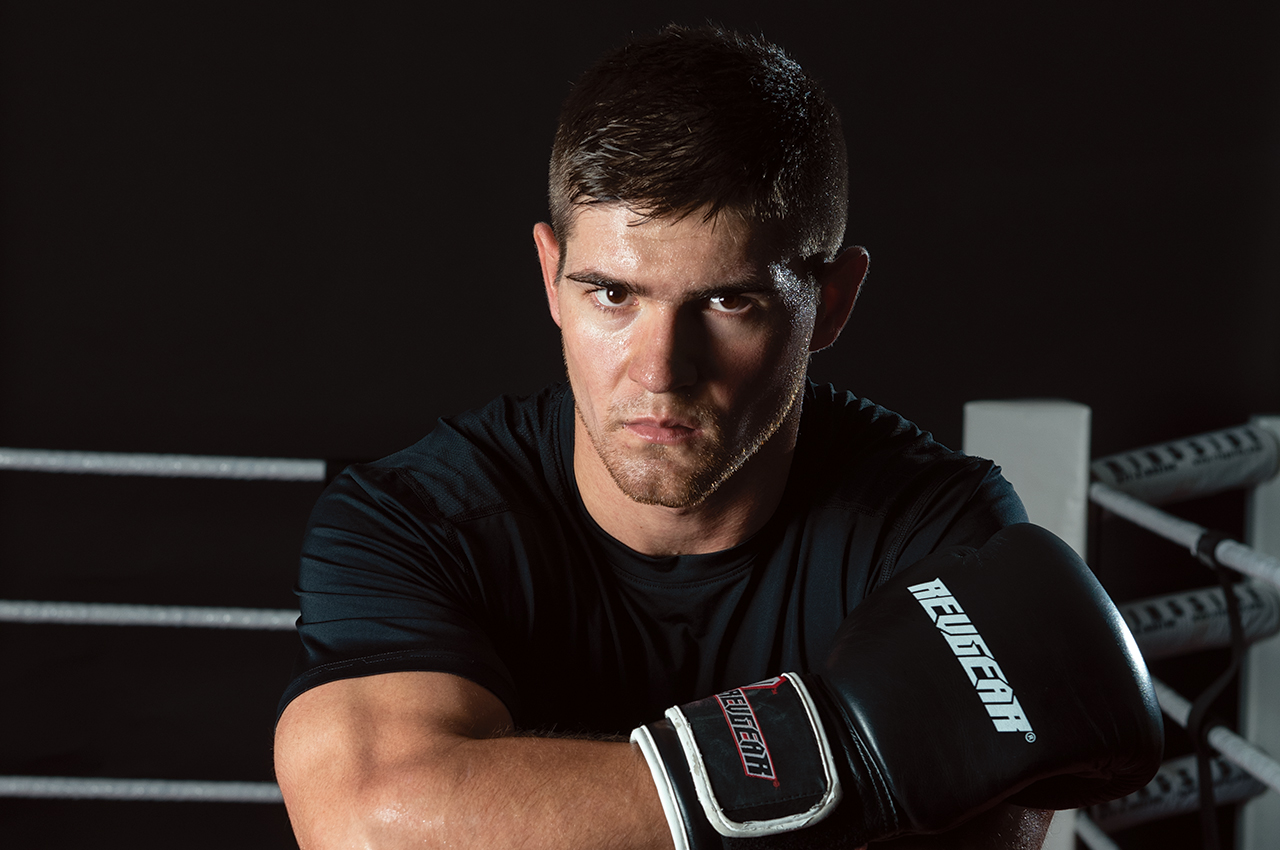Writer: Kelly Roberson
Photographer: Duane Tinkey
In July 2018, Kevin Vaughan-Carber (pictured, above) shed his robe and faced off in the middle of a boxing ring in Kolkata, India. For what? The improbable sport known as chessboxing.
Vaughan-Carber, 21, a Des Moines native, made quick work of his opponent in the championship match, landing a knockout
in the first round and bringing home the title of light heavyweight amateur world chessboxing champion. How he got from Drake University student to the ring and game board in this unlikely sport is a tale of dedication and duality.
At first glance, chess and boxing seem to have little in common: Brute force and quick thinking often decide the outcome in boxing, while chess is built on the idea of strategy and forethought. But for Vaughan-Carber, majoring in finance and quantitative economics, they were a natural fit.
A dedicated high school athlete, Vaughan-Carber also was a serious student of chess; when he transitioned to college he didn’t put either aside.
“A friend, Jack Kackenmaster, knew that I liked to exercise and that I play chess every day and told me about the sport,” Vaughan-Carber says. “It wasn’t something that I had to go out of my way to dive into—they were two hobbies I had, and I put them together.”
Chessboxing, started by Dutch native Lepe Rubingh, gained traction in the early 2000s in Germany. A round starts and ends with chess; competitors play five rounds of blitz chess for a total of 15 minutes of chess, interspersed by boxing rounds. So there are three minutes of chess, one minute to put on boxing gloves, three minutes of boxing, and one minute to take off the gloves. Little known in the U.S., the sport has a devoted following in Russia, China, Iran and India.
For Vaughan-Carber, it was a perfect union. “I’ve never met a chess player who can beat me in boxing, and never met any athlete who can beat me in chess,” he says. “I wouldn’t be a champion amateur boxer and I’m not a chess grand master. But if you combine both, I’m elite.”
In 2018, once Vaughan-Carber decided to compete internationally, his biggest challenge was his inexperience in boxing. For that, he found a gym, KC Iron Pit Boxing Academy in Kansas City, where he began to train during a summer internship in the city. Vaughan-Carber would wake up early and condition for 45 minutes—jogging, shuffling sprints, throwing punch combinations, biking, or rowing—and then when work ended, take a quick nap and box for two hours. And after that? An hour and a half of chess.
“When you get practice, you learn what not to do,” he says. “They weren’t training me to compete in amateur boxing. I didn’t have to be perfect; I just got good at a few things.”
And that is how he found himself last July among competitors from Finland, Germany, Russia, India and other countries. One other American, Matt Thomas of Atlanta, joined him, and Vaughan-Carber competed in the 209-pound, or 95-kilogram, division. He arrived in India early, exploring temples and memorials before the three-day tournament. What he discovered was that the sport’s elite competed at higher weights, and his matches were “anti-climactic,” with two knockouts in the first round. Thomas, the other American, also won, allowing the two together to place third overall as a team.
What Vaughan-Carber enjoyed most about the experience, though, was how the two sports bridged cultural and language barriers, either with fellow competitors or with Indian citizens. “I could sit down with a few of the kids competing and set up a chess position, play it out, and they’d learn from what I’d done,” he says. “Both games are played exactly the same no matter where you go in the world. I would give the same lessons to kids in India that I would get from a coach here.”
Because the sport’s popularity hasn’t spread to the U.S., Vaughan-Carber, who graduates this year and will pursue a master’s degree or work for a few years, has no plans to continue to compete, although he still plays chess every day and works out on heavy and speed bags.
What seems to many an unlikely combination has been, for Vaughan-Carber, a natural mashup. “In chess opening theory, rule No. 1 is that you control the center of the board and your opponent has to go around you,” he says. “In boxing, you want to control the middle of the ring. If I am in the middle, then … you have to bounce and skip and I just have to pivot. You have to be completely focused in both activities.”











